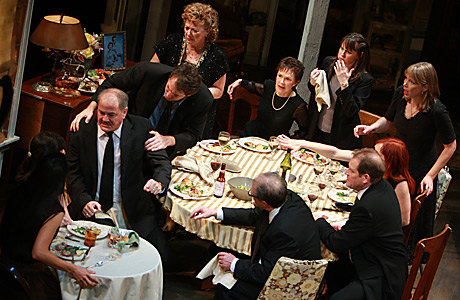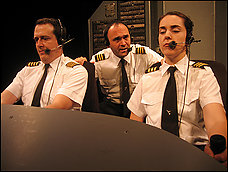Bless Jessa Crispin for this review of Sarah Hall’s Daughters of the North. It’s a great novel — well-paced, thought-provoking, beautifully written — the kind of novel you finish and immediately want to make all your friends read. Except the first couple times I tried to pass it on, my friends ran fleeing from the book, afraid it was The Handmaid’s Tale revisited. Because like Handmaid’s Tale, Hall’s novel is set in a dystopian future where, among other bad things, women are fitted with metallic doohickies that keep them from reproducing. But unlike Handmaid’s Tale, Sarah Hall’s novel isn’t, well, boring.
As Jessa writes:
I am aware that as a human being, and especially as a woman, I am supposed to like Margaret Atwood’s The Handmaid’s Tale. But when I read her 1985 novel of women living in a repressive theocratic regime, forced into either celibacy or involuntary breeding, all I could think was, “OK, so when do these women start stabbing people?” I like a good dystopia as much as anyone, but I prefer mine to come with an organized resistance army.
Exactly! I love Atwood, but I’ve always ranked The Handmaid’s Tale as my least favorite of her books (with The Blind Assassin at the top). It’s been a while but in my memory reading it was like taking a long forced march through flat, didactic country. Like reading The Fountainhead, where you stagger through the long speeches and philosophy desperately hoping for another scene of Howard Roarke and Dominique What’s-Her-Face throwing down.
In a Q & A that appears in the back of Daughters of the North, Sarah Hall says she set out to write a book that “[took] a look at the relationship between war and society and ask several questions. Under what circumstances might we have to turn to violence? Do we renege on our claim to be civilized when we go to war? Can we go to war in the defense of civilization? When is war right, and when is it wrong? And can women make good soldiers?” All big questions, but what I appreciated is how fully digested they were into the novel, and that the novel, in fact, remained a true novel: rich and engrossing and expressive of ambivalence, or negative capability. No polemic to duck, no long speeches to skip. (If anything, the novel’s chief flaw is its brevity; the ending is overly rushed and abrupt and a couple of the later narrative lines — such as the one with Chloe and Martin, if you’ve read the book — are advanced too quickly.)
One reason I think Daughters of the North works so well is how rooted it is in a very specific landscape, the Lake District in Cumbria in the north of England. The region colors not only the setting but the disposition of the characters — individual freedom may not make it to the future, but regional differences do — as well as the flavor of the novel’s sentences. Take this description as the novel’s heroine, Sister, leaves town:
Past the settlement border, in the lower area, the roads had deteriorated. They were much worse than I had imagined. In their years of redundancy they had sagged and rucked. Whole sections had been pulled away by the floods. They felt loose underfoot, like scree.
It’s the “rucked” and “scree” I like. Hall never overdoes it — you never feel like you’re being forced to eat an Anglo-Saxon dictionary — but she has a lovely, aware way of making the prose fit the landscape.
And when the landscape is described it’s with a beautiful, exacting simplicity:
An owl was flying over the grassland, sweeping down towards the ground and then up. Its white, clock-like face hovered gracefully, while its wings worked hard and silently in the air. For a second I caught a reflection in its eye, a weird flash of yellow-green, like a battery light flaring on then off again.
In that same back-of-the-book Q & A, Hall is asked to describe “the importance of Cumbria in your work,” and she answers:
My agent and editor have coined this phrase for my writing — “geo-fiction” — because landscapes feature so strongly in the novels, be it Morecambe Bay, New York, or Cumbria. I keep returning to the north of England in my work though. It’s difficult to say what it is about it that I find so compelling– but I don’t think it’s the fictive romantic notion of the Lake land. I don’t suffer from any romantic illusions about my home turf (stillborn lambs and filthy rains aren’t all that sublime), though I don’t deny its drama. I suppose being brought up in such a remarkable, natural, and feral place — my home was very remote and I spent most of my time outdoors, so you could say the land in part raised me — I now feel beholden to include it in my work.
RELATED: Listen to the Bat Segundo podcast with Sarah Hall.

 •
•  •
•  •
• 
 Having found that a cherished literary myth was nothing more than that, I searched the rest of Coming Up for Air and located four more semicolons. I was shocked–shocked! Maybe Louis Menand was
Having found that a cherished literary myth was nothing more than that, I searched the rest of Coming Up for Air and located four more semicolons. I was shocked–shocked! Maybe Louis Menand was